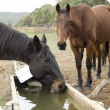Livestock biosecurity
The Department of Agriculture and Food, Western Australia’s Livestock Biosecurity Program is part of the national animal health framework that underpins and enhances Australia’s and Western Australia’s (WA) market access for animals and animal products.
The value of Australia’s export of animals and animal products relies on being able to maintain and demonstrate WA’s excellent animal health and residue-safe food status, a comprehensive livestock traceability system, regulated inter-state and intra-state movement to manage pest and diseases and industry supported disease control programs.
The Livestock Biosecurity Program manages a number of regulatory activities to support stock identification and traceability, disease surveillance, animal movement requirements and preparedness to respond to diseases such as foot and mouth disease and bovine spongiform encephalopathy (BSE). The consequences of these diseases are rated as being catastrophic to the Australian economy, and diseases such as H5N1 avian influenza and rabies may cause death in humans.
Additionally the program regulates activities to protect human health via food safety regulatory activities, chemical management and by monitoring for emerging zoonoses - diseases that can be transmitted from animals to humans.
Early detection of any significant animal disease incursion is essential to minimise the impact on the economy, the community and primary production. Any delay in detection would mean eradication and/or control will be considerably more difficult and expensive or, in the worst case scenario, may not be feasible at all.
Filter by search
Filter by topic
- Livestock & animals (120) Apply Livestock & animals filter
- Pests, weeds & diseases (120) Apply Pests, weeds & diseases filter
- Diseases (113) Apply Diseases filter
- Livestock health & diseases (109) Apply Livestock health & diseases filter
- Livestock disease surveillance (101) Apply Livestock disease surveillance filter
- Livestock species (83) Apply Livestock species filter
- Livestock management (50) Apply Livestock management filter
- Sheep (35) Apply Sheep filter
- Emergency animal disease preparedness (31) Apply Emergency animal disease preparedness filter
- Beef cattle (26) Apply Beef cattle filter
- Dairy cattle (21) Apply Dairy cattle filter
- Livestock movement & identification (20) Apply Livestock movement & identification filter
- Management & reproduction (17) Apply Management & reproduction filter
- Poultry & birds (15) Apply Poultry & birds filter
- Pigs (14) Apply Pigs filter
- Control methods (13) Apply Control methods filter
- Chemicals (12) Apply Chemicals filter
- Goats (11) Apply Goats filter
- Horses (10) Apply Horses filter
- Feeding & nutrition (10) Apply Feeding & nutrition filter
- Stockfeed (7) Apply Stockfeed filter
- Veterinary chemicals (7) Apply Veterinary chemicals filter
- Quarantine (7) Apply Quarantine filter
- Emergency response (7) Apply Emergency response filter
- Residues in livestock (6) Apply Residues in livestock filter
- Preventing residues (6) Apply Preventing residues filter
- Pests (5) Apply Pests filter
- Wildlife biosecurity (5) Apply Wildlife biosecurity filter
- Importing to Western Australia (5) Apply Importing to Western Australia filter
- Importing animals (5) Apply Importing animals filter
- Plant biosecurity (4) Apply Plant biosecurity filter
- Food, export & investment (4) Apply Food, export & investment filter
- Climate, land & water (4) Apply Climate, land & water filter
- Pest animals (3) Apply Pest animals filter
- Invasive species (3) Apply Invasive species filter
- Biosecurity governance (3) Apply Biosecurity governance filter
- Weeds (2) Apply Weeds filter
- Land use (2) Apply Land use filter
- Pest mammals (2) Apply Pest mammals filter
- Industry Funding Schemes (2) Apply Industry Funding Schemes filter
- Bees (2) Apply Bees filter
- Camelids (2) Apply Camelids filter
- Climate & weather (1) Apply Climate & weather filter
- Biosecurity and Agriculture Management Act (1) Apply Biosecurity and Agriculture Management Act filter
- Agribusiness Food & Trade (1) Apply Agribusiness Food & Trade filter
- Agricultural emergency response (1) Apply Agricultural emergency response filter
- Animal welfare (1) Apply Animal welfare filter





